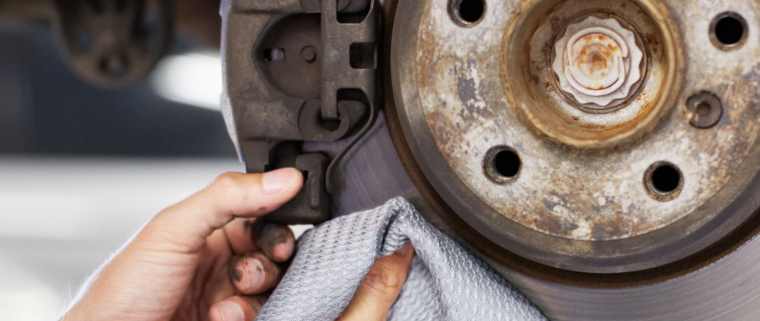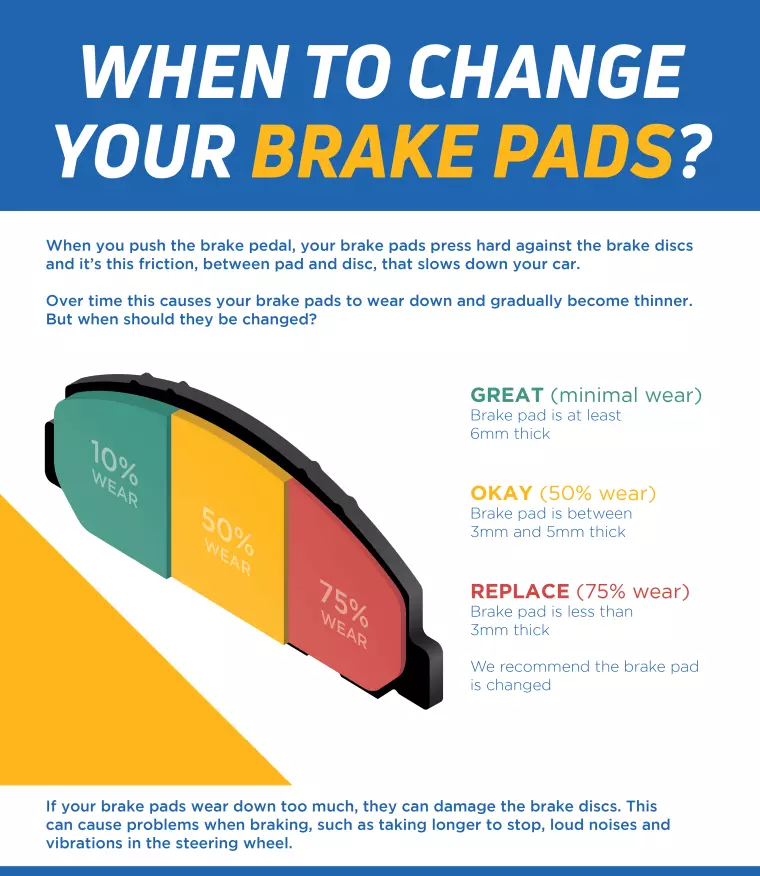When should you replace your brake pads?
| Wednesday 24th October 2018 9:15am

Thereís no denying the importance of brake pads. They allow you to slow down and stop safely, and in urgent situations, they can bring your vehicle to an abrupt halt, helping you to avoid collisions. Because of the crucial role they play, youíll no doubt want to ensure these features of your car are kept in good condition at all times.
Brake pads work by applying pressure and creating friction to help bring your car to a stop, meaning they suffer major wear and tear. As a result of this, they tend to need to be replaced on a regular basis. The average lifespan of these pieces of kit is approximately 50,000 miles, but this can vary considerably depending on a range of factors, including the type of vehicle and brake pads you have and your driving habits.
Keep reading to discover more about the issues that affect the longevity of these car components, and for advice on how to tell when they need to be replaced.

Different designs
There are different types of brake pads available, and some last longer than others. For example, organic versions (which are made from high-temperature resin combined with natural fibres) are typically the cheapest option but donít last as long as other models. In contrast, both low-metallic and semi-metallic pads have a longer life expectancy, although they tend to be noisier. The longest lasting of all are ceramic designs. They are more resistant to wear, although they are also typically more expensive to buy.
Driving habits
Itíll come as no surprise that the more miles you clock up behind the wheel, the faster you can expect your brake pads to deteriorate. Each time you put your foot down to slow your vehicle, youíre causing additional wear. However, itís not only the distance you travel that affects how quickly these components degrade. The types of roads you tend to travel on and your driving style will also have a big impact on wear and tear.
If you make most of your journeys on motorways, you should find that you cause less damage than if you spend a lot of time driving around cities and making shorter trips. This is simply because on motorways, thereís less stopping and starting.
The number of passengers and the loads you carry in your car will have an impact too. The heavier your vehicle is, the more strain youíll place on your braking system.
Consider your driving style as well. If youíre heavy footed on the pedals and tend to stop suddenly, you can expect to cause more damage to your brakes than if youíre cautious, anticipate the traffic ahead and lower your speed gradually in advance. Meanwhile, when you see junctions, roundabouts or turnings ahead and the road conditions allow for it, itís beneficial to take your foot off the accelerator and start to slow down before you have to apply the brakes.
You may be surprised by the impact these factors can have on the longevity of your brake pads. Whereas a set may last you upwards of 60,000 miles if you mostly stick to motorways and drive sensibly, you could find you need to replace these motoring must-haves after just 25,000 miles or even less if you predominantly travel in town or you have a habit of driving aggressively or erratically.
Warning signs
Because there are no hard and fast rules in terms of how many miles youíll get out of your brake pads, itís vital that you can spot the warning signs that tell you itís time to get replacement sets.
Many newer models of car are fitted with sensors that will tell you if the front or rear sets are getting worn down to below a safe level. If you have a vehicle like this, keep an eye out for the relevant warning light on your dashboard. If your car doesnít have these sensors, youíll need to make sure you get your brake pads checked on a regular basis. At Kwik Fit, we recommend that motorists whose annual mileage is around 8,000 miles or more a year should get their braking systems assessed at least twice a year, before long journeys and ahead of MOTs.
Whenever youíre driving, listen out for a screeching or grinding sound when you slow down or stop. This is a strong indication that you must replace these vehicle components. Also, if the brake pedal vibrates when you depress it, this may signify that the pads are warped due to heat and need to be replaced. Another tell-tale sign of damage is your car pulling to one side when youíre driving.
Your next step
If you spot any warning signs and think itís time to replace your carís brake pads, itís important to go to a professional technician. Always remember that these vehicle components are essential when it comes to safety, so they must be fitted by a trained expert. At Kwik Fit we have over 600 brake specialists across the country who can ensure this safety system is doing its job properly. Simply contact your local centre to book an appointment with our technicians, whoíll carry out a free inspection of your car.
Bear in mind that if you have new brake pads fitted, youíll need to make sure they Ďbed iní. Your technician will be able to explain this process to you and provide you with advice on how to do it. For safety, drive with extra care and attention for the first 300 miles or so until these new pieces of gear have bedded in properly.
Any facts, figures and prices shown in our blog articles are correct at time of publication.
Featured Articles
Is it Illegal to Drive With One Headlight?
Saturday 19th July 2025
Wondering if itís illegal to drive with one headlight? Learn about the safety risks and penalties of illegal blown bulbs and why you should fix them promptly.
Air Con in EVs & Hybrids: Experts Answer Your Questions
Monday 30th June 2025
Does air con drain EV batteries? Can you use the air con while charging an electric car? Find out the answers to these questions & more from Kwik Fitís experts.
Why Is Your Car Making a Noise? Fixes & Tips
Friday 13th June 2025
When your car starts making unexpected noises, it can certainly be quite disconcerting; it may be nothing to worry about, but hereís what you need to know.









